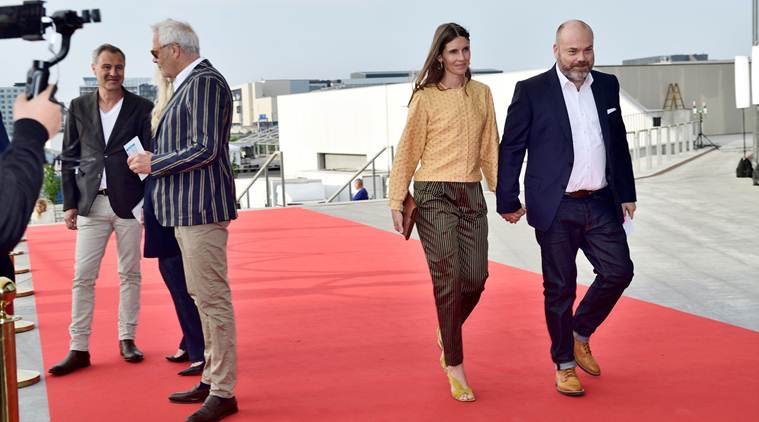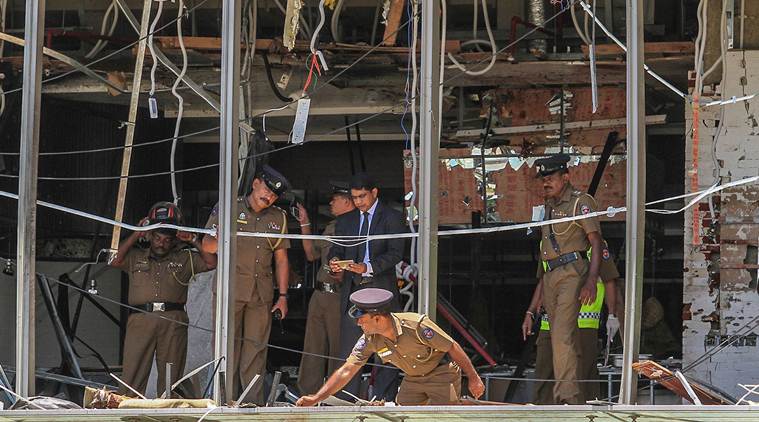
By Jeffrey Gettleman, Kai Schultz, Mujib Mashal and Russell Goldman
A little before 9 am Easter Sunday, Anders Holch Povlsen, the richest man in Denmark, was having breakfast with his family at the Table One restaurant in the Shangri-La Hotel in Sri Lanka’s capital, Colombo.
The restaurant was decorated with crates of oranges, apples and large, uncut pineapples, and the Povlsens looked out on the ocean rollers crashing into a sea wall not far away.
At the same time, Ilham Ibrahim, the son of one of Sri Lanka’s wealthiest spice traders, was heading down to Table One in an elevator. Wearing a baseball cap and a large backpack, he stepped into the elevator with a friend wearing the same thing. Right before the doors opened, CCTV shows, Ibrahim’s friend flashed him a long, white smile.
The two families, the Povlsens and the Ibrahims, were about to intersect.

One was a billionaire in dollars. The other, a billionaire in rupees. One amassed a fortune through jeans, turtlenecks and all kinds of hip clothing. The other, through white pepper, black pepper and all kinds of spices.
They both were well-known and admired, part of wildly successful, close-knit business families from opposite ends of the world and perhaps opposite ends of the ideological spectrum.
In an instant, five of their children — Ilham, Inshaf, Alma, Agnes and Alfred — were blown to pieces, one side slaughtered by the other.
Two of the Ibrahim sons — Ilham and his older brother, Inshaf — were among the suicide bombers behind the series of devastating attacks around the country. And Sri Lanka’s Muslims have been painfully perplexed by the question of why two of their most privileged sons would do this.
“Everybody keeps asking me that question,” said Hilmy Ahmed, vice president of the Muslim Council of Sri Lanka. “I don’t know if there ever will be an answer.”
A week after 250 people were killed in the attacks by Islamist extremists, Sri Lanka remains in shock. Fear is printed on so many faces. An unnatural quiet fills areas that should be busy, like Old Moor Street in Colombo where the Ibrahims ran their spice empire from behind an unassuming storefront with a gray gate.
A visionary businessman
The Shangri-La Hotel rises up as a sleek tower along Colombo’s scenic Galle Face drive, a 32-story rectangle of steel and bluish glass with unobstructed views of the Indian Ocean. The Povlsens stayed here, part of a beach vacation to Sri Lanka during their children’s Easter school break.
It was Anders, the intensely private chief executive of a huge family-run fashion company called Bestseller; his wife, Anne; and their four children, ages about 5 to 15.
Alma was the oldest. She had shared a few pictures of her trip on Instagram, but it was almost as if she were keeping her posts intentionally vague: glassy waves viewed from an empty beach, a tree canopy against a bright tropical sky, a portrait of her siblings, taken only from behind.
There could be a reason behind this. In the late 1990s, a blackmailer trespassed on Anders’ parents’ estate and threatened to kill them if he wasn’t paid. A few years later, kidnappers abducted a man for ransom in India, mistaking him for Povlsen.
Soren Jakobsen, a biographer who wrote about the Povlsens, said the family “has had security as their top priority for 20 years.” Anders, 46, didn’t like anyone taking his picture and avoided social media.
The Povlsens live in a secluded, 600-year-old manor house. They also own several castles and 220,000 acres in Scotland, which Anders has committed to “re-wilding,” as he calls it. He is worth about $8 billion, Forbes says.
He never showed his face
Mohamed Ibrahim loved to tell the story of his ring.
It was the late 1960s, and he was an uneducated teenage boy from Delthota, a small town in Sri Lanka’s lush center. He sold his favorite ring for bus fare to get to Colombo, by himself. He never looked back.
In the bowels of Colombo’s Muslim quarter, he slaved away as a cook, then as a vendor of onions. Then he got into sesame and pepper. Little by little, he inched up the spice trade.
Sri Lanka’s tropical climate and rich soil produce some of the world’s most desired spices. Until last week, Ibrahim ran one of the island’s biggest spice exporters, sending 20 million pounds of pepper to India each year.
He bought and sold so much, merchants said, that he could set the price. He also served as president of the Colombo Traders Association, lived in a million-dollar mansion on Colombo’s outskirts and kept a fleet of six cars, including a BMW.
Family members said Ibrahim, even at about 70, was a tireless worker, up at 4 a.m., off to the mosque, then a simple breakfast at home. He spent the rest of the day in his spice factory, rubbing the peppercorns between his fingers, inspecting the quality of his products.
His eldest son, Inshaf, about 35, was flashier. He drove a new white Toyota Landcruiser and stood taller than most Sri Lankan men, about 5 feet 11 inches, with a muscular build. Friends said he walked fast, no matter where he was going.
Years ago, at D.S. Senanayake, considered one of Colombo’s most prestigious schools, his nickname was Kudda, or Powder, an affectionate reference to the family’s spice business.
Inshaf was being groomed to take over, and his father set him up with a copper pipe factory. A picture from 2016 shows Inshaf beaming as he and his father accept an award from a minister — one of several awards bestowed on the Ibrahims from the Sri Lankan government.
He was a handsome man, healthy looking, and sported a snug-fitting gray suit and a long wispy beard.
Ilham, the second son, about 31, was more withdrawn. Merchants on Old Moor Street barely saw him. It seems his job was to oversee a family pepper farm near Matale, a city a few hours away.
‘Be strong’
It’s not clear how long the Povlsens spent in Colombo: Alma’s Instagram posts indicate that she was in Sri Lanka at least four days. One image, taken the Thursday before Easter and tagged Sri Lanka, shows three younger children, presumably her siblings, sitting at the edge of a swimming pool framed by tall palm trees. The caption reads: “Three little darlings.”
The night before the Easter attacks, according to a family member who spoke with journalists, Inshaf told his wife he was traveling to Zambia. As he said goodbye, he lingered an extra moment outside the car and said, “Be strong.”
He then checked into the Cinnamon Grand hotel in Colombo. His brother Ilham checked into the Shangri-La. Inshaf used a fake identity card, but Ilham used his real identification, a decision that, after the attacks, would have additional deadly consequences.
CCTV footage from the Shangri-La shows Ilham stepping into the elevator and later into the Table One restaurant with another man who has now been identified as Zaharan Hashim, the bombings’ suspected mastermind. When the authorities figure out how they met, it will unlock a lot about what was about to unfold.
It is not clear how Zaharan and Ilham met, but members of the Ibrahim extended family say Ilham was more devout than others in his family and that his young wife, Fatima, covered her entire face with a veil, unusual in Sri Lanka.
The mutual attraction makes sense: If Ilham was looking for spiritual guidance, Zaharan may have offered that. And if Zaharan had murderous plans, then the Ibrahim family fortune could help finance them.
Mother blows up her children
On Easter Sunday, the skies above Colombo were clear. The sun beat down. All of the major hotels — and churches — were crowded.
Table One was filling with guests. They sat in long rows in green cushioned chairs, the room lit by bright windows. The food on offer included the likes of English breakfast sausages, fish curry and string hoppers (spongy rice noodles popular in Sri Lanka).
Ilham and Zaharan entered the restaurant from different sides. At about 8:50 a.m., they blew themselves up.
Thirty-three people were killed at the Shangri-La, including three of Povlsen’s four children. It is not clear how the blast killed half the family and spared the rest.
In a photo taken at the National Hospital of Sri Lanka in Colombo a few hours later, a man who appears to be Povlsen clutches a mobile phone to his ear, his shirt stained with blood, his left eye nearly swollen shut. When a Sri Lankan journalist asked to speak to him, he shook his head.
At the Cinnamon Grand, CCTV footage shows Inshaf, wearing a backpack and ball cap, stepping into the buffet room. But then he stops. He walks forward and then back, forward and then back, several times, his body tight.
“He was clearly reluctant,” the family member said. “He was always more connected to people than Ilham.”
But whatever hesitation he might have been feeling, Inshaf overcame it. He killed himself and 20 others.
Within minutes of one another, seven suicide bombers across Sri Lanka detonated backpacks stuffed with powerful explosives, blowing apart people at three hotels and three churches.
Because Ilham used his real identification card when he checked into Shangri-La, the police quickly figured out who he was. Within hours, constables swarmed the Ibrahim mansion.
They were greeted at the door by a woman who then turned around and dashed up the stairs. It was Fatima, Ilham’s wife.
At the top of the stairs in front of her three children, Fatima blew herself up, killing three police officers and all the children, ages 5, 4 and 9 months. Police officials said she might have been pregnant, too.
Ibrahim, the family patriarch, was handcuffed to a police officer and taken away.